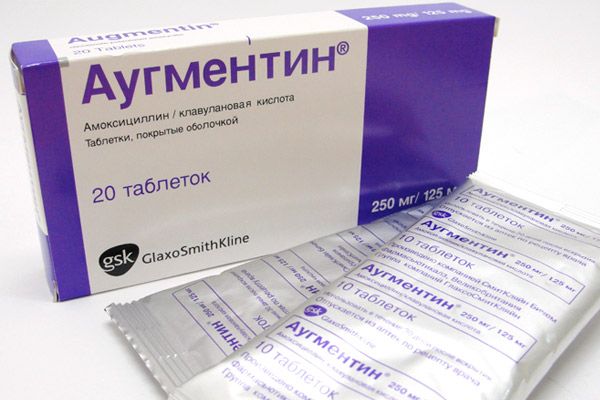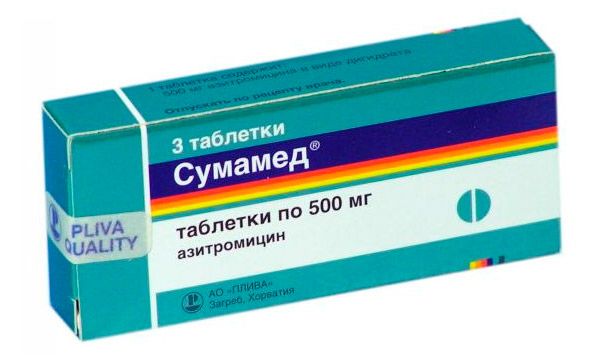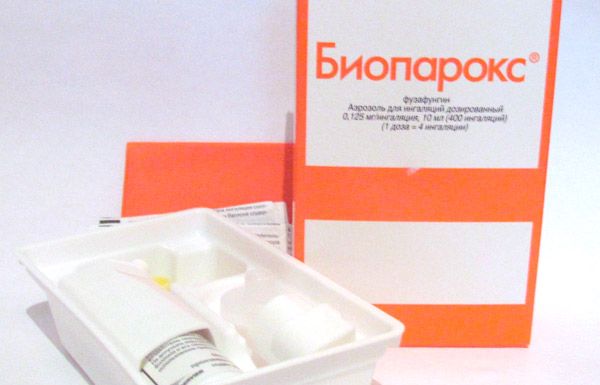Medical expert of the article
New publications
Preparations
Antibiotics for sore throat in children
Last reviewed: 03.07.2025

All iLive content is medically reviewed or fact checked to ensure as much factual accuracy as possible.
We have strict sourcing guidelines and only link to reputable media sites, academic research institutions and, whenever possible, medically peer reviewed studies. Note that the numbers in parentheses ([1], [2], etc.) are clickable links to these studies.
If you feel that any of our content is inaccurate, out-of-date, or otherwise questionable, please select it and press Ctrl + Enter.

Antibiotics for sore throat in children are the simplest and most effective way to relieve pain and relieve symptoms of the disease. But can children take antibiotics, how effective are they in treating sore throat, and how to choose the right ones?
Antibiotics for sore throat in children do not act locally, so when taking an antibiotic, the drug affects not only the respiratory system, but also the entire body of the child. As a rule, children are prescribed broad-spectrum antibiotics that fight the infection in the body that caused the sore throat. Antibiotics must be taken as directed by a doctor, since without special indications, their use will be absolutely useless and can cause side effects.
A child's sore throat may be caused by a cold that has been suffered and not treated properly, acute respiratory infections, herpes virus and other infections. In these cases, the child is prescribed antibiotics that will help fight the secondary infection. Antibiotics for sore throat in children are usually taken for no longer than ten days and only if the child has a high temperature, or there are purulent follicles on the tonsils or pronounced plaque. If the child has classic streptococcal sore throat (enlarged lymph nodes, no cough), then antibiotics are used that effectively fight this type of infection, but most often the treatment is carried out without taking antibiotics. In any case, antibiotics are prescribed only after a complete anamnesis and study of the symptoms of the disease.
Indications for the use of antibiotics for sore throat in children
Indications for the use of antibiotics for sore throat in children depend entirely on the symptoms of the disease. But before buying antibiotics and treating sore throat with them, let's consider what this disease is and what is its danger for a child. Sore throat is an acute infectious and inflammatory disease. Sore throat occurs due to the effects of beta-hemolytic streptococci of group A, that is, bacteria, not a virus, as many believe.
That is why the indications for the use of antibiotics for sore throat in children are based on the treatment of the cause of the disease. Knowing the cause, you can choose a safe and effective antibiotic that has high sensitivity to the infection. Thus, streptococci are sensitive to penicillin antibiotics. Therefore, most pediatricians prescribe them.
If the baby is allergic to penicillin drugs, then the macrolide group is chosen as antibiotics. These are effective drugs that have low toxicity and destroy various bacteria and pathogens of inflammatory diseases. The most popular drug from this group of antibiotics is Erythromycin and its analogues - Aschicide, Hemomycin and others.
Antibiotics for purulent tonsillitis in children
Antibiotics for purulent tonsillitis in children are prescribed only by a doctor, since purulent tonsillitis is a very serious disease that requires medical care. At the first symptoms of tonsillitis in a child, it is necessary to prepare a solution for gargling, that is, the simplest antibiotic. This will alleviate painful symptoms before going to the doctor. You can gargle with warm water, to which a few drops of iodine, a spoonful of salt and soda have been added. But such procedures are not a treatment for the disease, so seeking medical help is essential.
The doctor will prescribe antibiotics for the treatment of purulent tonsillitis. So, if the child is not allergic to penicillin drugs, then the treatment will be carried out with these antibiotics. If the baby has an allergy, then antibiotics such as Lendacin, Siflox, Rulid and others are excellent for the treatment of purulent tonsillitis. In addition, the child will be prescribed antibiotics that will allow disinfection and disinfection of the oral cavity. Such drugs include: Hexasprey, Faringosept, Hexoral.
Release form
The form of antibiotics for treating sore throat in children should be as convenient as possible. Thus, when taking antibiotics by infants, preference is given to solutions and syrups, since it is difficult for a baby to swallow tablets. Let's consider the main forms of antibiotics.
- Suspensions - antibiotics in this form of release do not create difficulties when taken. The drug is a bottle, which is intended for the preparation of a suspension and a dosing syringe. A certain dose of antibiotic is collected with a syringe, mixed with warm water and given to the child for oral administration. A syringe with a marked dosage of the drug is a guarantee that the child will not have an antibiotic overdose.
- Tablets, capsules – antibiotics in this form are suitable for older children. If tablets are prescribed to infants, the drug is recommended to be crushed, diluted in water and given to the baby, since it will be difficult for a small child to swallow a tablet or capsule whole.
- Syrups are one of the popular forms of antibiotics for sore throat in children. The advantage of syrups is that they are easy to take. Manufacturers have made sure that the syrup has a pleasant taste and smell.
- Injections are the most effective form of antibiotics for treating sore throats in children. The effectiveness is due to the fact that the drug is administered intramuscularly, and it quickly spreads throughout the body and fights the infection.
- Sprays are a convenient and popular form of antibiotics. Sprays are used for local treatment of sore throat in children. Such drugs have an anti-inflammatory effect, so they effectively relieve painful symptoms.
- Drops - an antibiotic in this form of release is used for rinsing and inhalation.
The form of antibiotic release for the treatment of sore throat in a child should not cause problems and inconveniences during administration. Thus, some children are prescribed suspensions, others capsules and tablets, and others for effective treatment - antibiotic injections.
Pharmacodynamics of antibiotics for sore throat in children
Pharmacodynamics of antibiotics for sore throat in children allows you to find out how active substances affect the child's body and pathogenic microorganisms. Let's look at the pharmacodynamics of penicillin antibiotics, since they are most often prescribed for the treatment of sore throat in children.
Penicillin antibiotics are antimicrobial drugs produced by different types of mold fungi - penicillium. All antibiotics have almost the same effect, which is associated with disruption of the synthesis of some components of cell walls. Due to this, the effect of pathogenic microorganisms is slowed down and their gradual destruction occurs. But penicillin antibiotics have a number of side effects and in some cases cause irritation (dysbacteriosis, nausea, skin lesions).
Pharmacokinetics of antibiotics for sore throat in children
Pharmacokinetics of antibiotics for sore throat in children is the processes of absorption, distribution, metabolism and excretion of drugs. Let's consider all these processes using penicillin antibiotics as an example.
After administration, the antibiotic is quickly absorbed by the digestive tract. The rate of absorption depends on the individual characteristics of the child's body and the reaction to the drug. The maximum concentration in the blood is observed 1.5-2 hours after administration, and the bioavailability of the drug is 40-60%. The antibiotic is metabolized in the liver and excreted from the child's body with urine. The half-life is from 2 to 4 hours, depending on kidney function.
Names of antibiotics for sore throat in children
The names of antibiotics for sore throat in children allow you to navigate when choosing an effective and safe drug. Thus, special attention, when choosing antibiotics for sore throat in children, is given to penicillins, since they show an effective action against streptococcal infections and are easily tolerated by children. Let's consider the names of antibiotics for sore throat in children.
- Amoxicillin and preparations based on it with clavulanic acid. These are broad-spectrum antibiotics: Augmentin, Solutab and others.

- Sumamed, Cephalexin and Zinnat are effective antibiotics for the treatment of sore throat in children with drug allergies.

- Cephalosporins are effective antibiotics that are prescribed only when absolutely necessary, as they have a number of side effects that are dangerous for children.
- Bioparox is a drug considered a local antibiotic and is popular due to its convenient form (inhalation spray).

Other medications used for sore throat in children:
- Suprastin, Cetrin are antihistamines in syrup form.
- Tonsilgon is a herbal remedy that can be taken for sore throat even by infants.
Please note that the course of antibiotic treatment should be from three to ten days, depending on the age of the child and the symptoms of the sore throat.
Method of administration and dosage
The method of application and dosage of antibiotics for sore throat in children completely depend on the complexity of the disease, symptoms, age of the child and type of antibiotic. Each antibiotic has its own dosage, and the method of application depends on the form of release of the drug.
The dosage of antibiotics is calculated by the doctor based on the child's weight. The drug is taken according to the instructions. Thus, some antibiotics should be taken strictly before meals, and others only after meals. In addition, it is necessary to observe the time of taking the drugs. Antibiotics should be taken from five to ten days, but not longer, since the pathogens lose sensitivity to the drug.
Contraindications to the use of antibiotics for sore throat in children
Contraindications to the use of antibiotics for sore throat in children are based on individual intolerance to certain drugs. So, if a child has problems with the liver or kidneys, antibiotics are prescribed with great caution, and many of them are completely contraindicated. Taking antibiotics can provoke an exacerbation of diseases and cause serious allergic reactions.
Most often, contraindications to the use of antibiotics for sore throat concern patients under three years of age. Therefore, antibiotics should be prescribed by a doctor after diagnosing the disease. It is not recommended to take antibiotics on your own, and it is also not recommended to take them longer than the specified time, as this will negatively affect the child's fragile immune system.
Side effects of antibiotics for sore throat in children
Side effects of antibiotics for sore throat in children can occur due to drug overdose, long-term use, non-compliance with the dose and individual characteristics of the body. Let's look at the most common side effects that occur when children take antibiotics.
- Problems with the digestive system.
- Nausea.
- Cholestatic jaundice.
- Diarrhea.
- Oral candidiasis.
- Allergic rashes and skin dermatitis.
- Anaphylactic shock and others.
If the above effects occur, you should stop giving the child the antibiotic and seek medical help.
Overdose
An antibiotic overdose may occur due to an incorrectly calculated dose of the drug, failure to follow the rules for taking the drug, or prolonged use. The main symptoms of an overdose are vomiting, nausea, liver and kidney dysfunction, and dizziness.
The main rule for treating an overdose is to stop taking antibiotics. Also, to treat an overdose, take activated charcoal, wash out the stomach, and monitor the child's breathing. If more serious symptoms occur, seek immediate medical attention.
Interactions of antibiotics for sore throat in children with other drugs
Interaction of antibiotics for sore throat in children with other drugs is possible only if their effect is not weakened by simultaneous administration of drugs. It is not recommended to take Chloramphenicol and Erythromycin, as their interaction significantly reduces the effectiveness of treatment.
When prescribing certain antibiotics for sore throat in children, the doctor selects the drugs so that their interaction does not cause side effects and does not cause an overdose due to the increased concentration of active substances. The simultaneous use of macrolide antibiotics with penicillin is considered effective. You cannot give antibiotics for sore throat to children on your own, since without knowing the interaction of drugs, you can cause serious and even life-threatening reactions of the body to the drugs.
Storage conditions for antibiotics for sore throat in children
The storage conditions for antibiotics for sore throat in children are no different from the rules for storing any other medications. If the antibiotic is in tablets or capsules, they must be stored no longer than the expiration date indicated on the packaging, away from sunlight and only at room temperature.
If a child has been prescribed an antibiotic in the form of injections, then it should be stored in an opened form for no longer than 24 hours. As for suspensions, they cannot be stored in the refrigerator, since many antibiotics lose their medicinal properties, since the temperature limit of their effectiveness is +15. Precise information on the storage of a particular antibiotic can be found in the instructions that come with the drug.
Best before date
The shelf life of antibiotics prescribed to children for sore throat can be from 6 months to 48. The shelf life depends on the form of the drug and storage conditions. Thus, failure to comply with storage rules automatically reduces the effectiveness of the antibiotic to zero, we can say that the shelf life of such a drug has expired prematurely. It is prohibited to use antibiotics after the expiration date. In children, such drugs can cause uncontrolled reactions of the body and lead to very disastrous consequences. Therefore, if you are not sure that the storage conditions of the antibiotic were observed or you have an antibiotic whose expiration date has expired, but it has never been used, it must be disposed of.
Antibiotics for sore throat in children are effective drugs that fight harmful microorganisms and speed up the child's recovery. Any antibiotics are allowed to be taken only as prescribed by a doctor.
Attention!
To simplify the perception of information, this instruction for use of the drug "Antibiotics for sore throat in children" translated and presented in a special form on the basis of the official instructions for medical use of the drug. Before use read the annotation that came directly to medicines.
Description provided for informational purposes and is not a guide to self-healing. The need for this drug, the purpose of the treatment regimen, methods and dose of the drug is determined solely by the attending physician. Self-medication is dangerous for your health.


 [
[